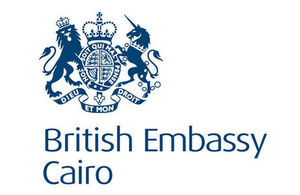British embassy resumes public services in Cairo

CAIRO, Dec 16 (Aswat Masriya) – The British embassy in Cairo reopened its doors and resumed public services on Tuesday, after nine days of suspension citing “security reasons”, the embassy announced on its website.
In a press release, the embassy said that the resumption of its services came “after security issues related to the building were resolved in cooperation with the Egyptian government.”
British Foreign Secretary Philip Hammond expressed his gratitude for the Egyptian government for making “this reo-opening possible”.
“Britain and Egypt have strong bonds between our people, essential commercial links, and cooperate closely in a number of areas,” Hammond said in the statement. “This same cooperation also sees thousands of British holiday-makers heading off for the Egyptian sun every Christmas and New Year.”
British Ambassador to Egypt John Casson stressed that “Britain’s commitment to Egypt’s success is as deep and strong as ever.”
“In the days ahead we will be investing in Egyptian education through the new £20m Newton-Mosharafa fund, welcoming thousands of tourists for the Christmas break, and preparing for a trade mission in January to create Egyptian jobs with British investment,” he said in the statement.
The British Embassy in Cairo had suspended on December 7 public services due to "security considerations", according to an embassy spokesperson. He added that the decision was taken "to ensure the security of the embassy and its staff."
Hany Abdel Lattif, Egypt’s interior ministry spokesman, owed the embassy’s closure to the United Kingdom’s fear of terrorist attacks which might target its interests globally, hinting that the embassy had found the security measures insufficient and therefore suspended its services until the measures are reviewed.
In a travel advice to Egypt last updated last week, the UK's Foreign and Commonwealth Office warned of "a heightened threat of terrorist attacks globally against UK interests and British nationals from groups or individuals motivated by the conflict in Iraq and Syria."
The Canadian Embassy in Cairo also announced the suspension of its services "until further notice" on December 8, citing "unsettled security conditions".
The embassy remains closed.
Both the Canadian and the UK embassies are located in Garden City, a few metres away from one another. Also located nearby is the United States embassy. The latter nevertheless did not suspend its operations.
The embassies closure threatened to negatively affect Egypt's shaky tourism industry and therefore impact its recovering economy.
A security source, who spoke on condition of anonymity, told Reuters on Sunday that a recently-detained suspected militant had confessed to Egyptian authorities "plans to target foreign embassies."
The UK embassy spokesperson told Aswat Masriya he cannot comment on such "speculations".
In a travel advice to Egypt posted on December 6, the Australian Department of Foreign Affairs advised its citizens to "reconsider [their] need to travel" to Egypt overall, while advising against travel to North Sinai.
"Reports of early December 2014 indicate that terrorists may be planning attacks against tourist sites, government ministries and embassies in Cairo," the travel advice read.
Militants have stepped up attacks targeting security forces in Egypt, particularly in the Sinai Peninsula, since the army's ouster of Islamist President Mohamed Mursi in July 2013, which followed mass protests against his rule.
At least 30 military personnel were killed in a suicide blast which targeted a security checkpoint in Sinai's Sheikh Zuweid on October 24, in the worst militant attack since Mursi's ouster.
Ansar Bayt al-Maqdis, which has changed its name to Sinai Province since pledging allegiance to the leader of the Islamic State fighters in Iraq and Syria, claimed responsibility for the attack in a video released on November 14.
The militant group claimed on December 1 responsibility for the killing of an American petroleum engineer who was found dead in a car in the desert last August.









facebook comments